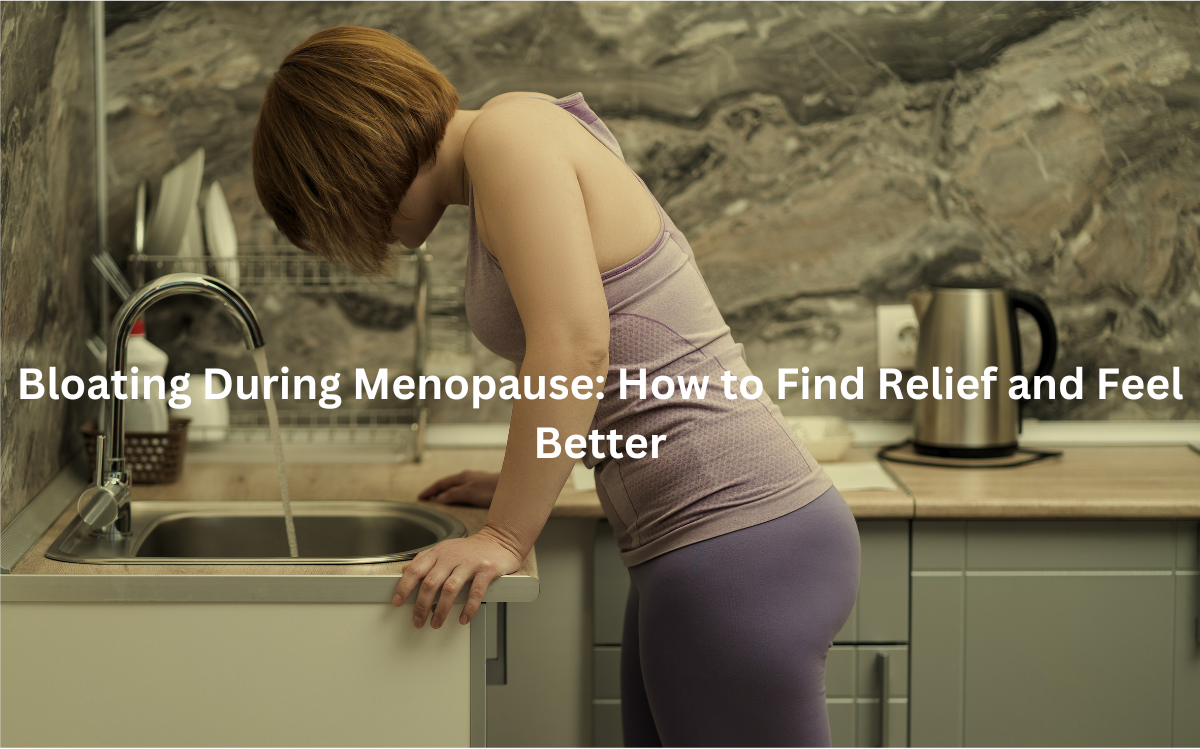Struggling with bloating during menopause? Learn how hormonal changes impact digestion and ways to reduce discomfort.
Bloating is a common yet uncomfortable symptom during menopause. As oestrogen and progesterone levels fluctuate, many women experience abdominal pain, gas, and water retention. (1)
This can lead to feelings of fullness and discomfort, making it hard to go about daily life. But understanding the root causes and making a few changes to diet, exercise, and lifestyle can help manage and reduce bloating during this transition.
Key Takeaways
- Hormonal Changes: Fluctuating hormone levels are a major cause of bloating, affecting digestion and fluid retention.
- Dietary Adjustments: Increasing fiber intake, staying hydrated, and avoiding trigger foods can reduce bloating significantly.
- Physical Activity & Stress Management: Regular exercise and stress-relief practices can improve digestion and help alleviate bloating symptoms.
Understanding Bloating During Menopause
Bloating is a feeling of fullness, pressure, or discomfort in the stomach that can occur at any point during menopause. It often manifests as a swollen or distended abdomen, which can be uncomfortable and frustrating.
During menopause, hormonal fluctuations—particularly the changes in oestrogen and progesterone levels—can significantly impact digestion and water retention, leading to bloating.
As oestrogen levels decrease, the body may struggle with regulating digestion. The lower levels of oestrogen can also affect the muscles of the digestive tract, slowing down peristalsis, the wave-like movements that push food through the intestines.
This slow-down can result in constipation, one of the common causes of bloating. Progesterone, on the other hand, increases the body’s ability to retain water and sodium, leading to water retention and further contributing to the bloating sensation.
This combination of hormonal shifts can make bloating during menopause a frequent and unwelcome symptom.
Common Symptoms of Menopausal Bloating
The symptoms of bloating during menopause often go beyond just a feeling of fullness in the stomach. Women may also experience:
- Abdominal pain: This discomfort can be sharp, crampy, or feel like a constant heaviness in the stomach area.
- Excessive gas: Gas build-up can lead to gurgling sounds or even visible bloating, making it hard to hide the discomfort.
- Water retention: The body can feel heavier, and clothes might fit tighter around the waist.
This bloating can last much longer than the after-effects of a large meal. It can sometimes be more painful as well.
Additionally, bloating often overlaps with other common menopause symptoms such as:
- Hot flashes
- Night sweats
- Mood swings
So, it’s not unusual for women to feel overwhelmed by a collection of symptoms that seem to come at once.
What Causes Bloating During Menopause?
Hormonal Changes
Decreased oestrogen levels during menopause affect more than just reproductive health—they can also influence digestion. As oestrogen drops, the body’s ability to process food becomes less efficient. A slower digestive process leads to constipation, which in turn can cause bloating.
Additionally, oestrogen helps maintain fluid balance in the body, so as levels drop, the body tends to retain more water, exacerbating bloating.
Digestive System Impact
Along with hormonal changes, the menopausal shift can cause the digestive system to slow down. Slower peristalsis means that food stays in the digestive tract longer, fermenting and producing excess gas. This can leave women feeling bloated or uncomfortable.
This constipation can also worsen other symptoms like abdominal cramping and excessive gas.
Weight Gain
As women age, they may experience changes in their body composition, including weight gain, especially around the abdominal area. This weight gain can be exacerbated by a slowdown in metabolism, which is commonly seen during menopause due to hormonal changes.
The increased abdominal fat can push on the intestines, leading to bloating and discomfort. This weight gain is often harder to manage during menopause due to changes in activity levels, metabolism, and sometimes stress, which can all contribute to abdominal bloating.
Water Retention
Water retention is another common issue during menopause. As progesterone levels fluctuate, the body can hold onto excess fluid, especially in the abdomen, legs, and feet.
The increase in fluid retention adds to the bloated feeling, especially during the more challenging phases of menopause. It can be especially uncomfortable when combined with constipation, creating a constant sensation of fullness and heaviness.
Effective Dietary Changes to Reduce Bloating
Increase Fiber Intake
One of the best ways to combat bloating during menopause is by increasing dietary fiber. Fiber-rich foods such as fruits, vegetables, and whole grains can help keep the digestive system running smoothly. Fiber helps bulk up the stool, easing constipation and helping to push gas through the intestines.
Foods like apples, pears, leafy greens, and whole wheat are great choices for keeping digestion on track. Aim for at least 25-30 grams of fiber per day, but if you’re new to fiber, start small and gradually increase your intake to avoid excess gas.
Avoid Trigger Foods
Certain foods and beverages are more likely to contribute to bloating, especially during menopause. Processed foods, high-sodium snacks, and sugary foods can all lead to water retention and exacerbate bloating.
Caffeine and alcohol can irritate the digestive system and make bloating worse. Dairy products are another common culprit, especially for those who are lactose intolerant, as they can cause gas, cramps, and bloating. Women can try to limit or eliminate these triggers to see if their bloating improves.
Hydration
It may sound counterintuitive, but drinking enough water can actually help reduce bloating. Staying hydrated helps the kidneys flush out excess sodium, reducing water retention.
Additionally, drinking plenty of water keeps the digestive system functioning properly, easing constipation and helping to reduce the overall feeling of fullness and discomfort. Aim to drink at least 8 cups (2 liters) of water each day to support overall hydration and digestive health.
Probiotics
Probiotics are beneficial bacteria that help keep the gut healthy and support digestion. Incorporating probiotic-rich foods, such as yogurt, kefir, or fermented vegetables like kimchi, can be particularly helpful for women experiencing bloating during menopause.
These foods can aid in balancing gut bacteria, promoting better digestion, and reducing the chances of bloating caused by gas build-up.
Physical Activity to Alleviate Bloating

Exercise
Physical activity is crucial for reducing bloating and promoting overall digestive health. Regular exercise, especially aerobic exercises like walking, swimming, or cycling, can help improve gut motility, making it easier for food to pass through the digestive system.
Strength training also plays an important role by increasing muscle mass, which can help keep the metabolism functioning at a healthy rate. Additionally, regular movement helps prevent weight gain, which is often linked to bloating.
Stress Reduction
Stress is often underestimated when it comes to bloating, but it can be a major trigger. When the body is stressed, it releases hormones like cortisol that can slow down digestion and increase water retention.
Engaging in stress-reducing activities like yoga, meditation, and deep breathing exercises can help keep cortisol levels in check, supporting overall digestive function. Even short periods of relaxation throughout the day can significantly help reduce bloating during menopause.
How Hormone Replacement Therapy (HRT) Can Help with Bloating
Hormone Replacement Therapy (HRT) is often used to help alleviate many menopause symptoms, including bloating. By restoring hormonal balance, HRT can ease the digestive issues caused by fluctuating oestrogen and progesterone levels. (2)
For many women, balancing these hormones can reduce bloating and other common menopausal symptoms like hot flashes and night sweats.
There are different forms of HRT, including oral tablets, transdermal patches, and gels. Transdermal options, such as patches or gels, are often preferred because they bypass the digestive system, reducing the risk of bloating caused by oral medications.
Women experiencing bloating due to hormonal changes might find significant relief with the right form of HRT, but it’s always best to consult with a healthcare professional to determine the most suitable option.
Non-Hormonal Solutions for Menopausal Bloating
In cases where HRT isn’t an option, there are other ways to address bloating during menopause. Medications like SSRIs (selective serotonin reuptake inhibitors) or SNRIs (serotonin-norepinephrine reuptake inhibitors) can help reduce bloating by alleviating the anxiety or stress that often accompanies menopause.
Magnesium supplements are another non-hormonal option that can help relieve bloating by promoting regular bowel movements.
Certain dietary supplements, including peppermint oil, digestive enzymes, or ginger, can also be helpful for easing bloating. These supplements work by soothing the digestive tract or stimulating better digestion, offering some relief without hormones.
Managing Bloating and Mental Health During Menopause
Menopause can take a toll on a woman’s mental health, and dealing with bloating can exacerbate these feelings. The discomfort and frustration of bloating can impact self-esteem, making women feel more self-conscious or irritable.
It’s important to address mental well-being alongside physical health during menopause. Women should be encouraged to practice self-care, whether through relaxation techniques, connecting with others, or seeking professional help if needed.
Taking a holistic approach to managing menopause symptoms—both physical and emotional—is key to navigating this transitional time. By addressing bloating with a combination of lifestyle changes, dietary modifications, and mental health support, women can reduce discomfort and improve their quality of life.
Conclusion
Managing bloating during menopause requires a comprehensive approach. Understanding the role of hormones, making the right dietary choices, staying active, and considering non-hormonal treatments or HRT can help relieve bloating symptoms. With the right mental and emotional support, women can approach this phase with greater ease.
For professional guidance and personalised care, book your consultation with Modern Menopause and get the support you deserve.
FAQ
What are common causes of bloating during menopause?
Bloating during menopause is often caused by hormonal fluctuations that impact gut health, leading to symptoms like gas retention and painful bloating. Women may experience discomfort from consuming trigger foods like fatty foods or carbonated drinks.
High salt intake, stress and anxiety, and swallowing air can also contribute to bloating. Maintaining a balanced diet and staying hydrated, alongside reducing stress, may help manage bloating.
Can hormone therapy help with bloating during menopause?
Hormone therapy (HRT) can help reduce bloating by stabilising hormone levels, which is crucial for managing menopause bloating. While HRT might relieve painful bloating, some women may experience side effects.
Combining HRT with a healthy diet and smaller meals can further help manage symptoms, including gas retention and intestinal gas. It’s essential to consult a healthcare professional to determine if HRT is right for you.
How can stress and anxiety contribute to bloating during menopause?
Stress and anxiety, common during menopause, can trigger bloating by affecting the gastrointestinal tract. These emotional symptoms can worsen other menopause symptoms like gas retention, painful bloating, and uncomfortable abdominal pressure.
Managing stress through relaxation techniques, exercising regularly, and drinking plenty of water can help reduce bloating and ease anxiety, providing relief for menopausal women.
What role does diet play in managing bloating during menopause?
A healthy, balanced diet can help control bloating during menopause. Eating smaller meals throughout the day, avoiding trigger foods like fatty foods and carbonated beverages, and limiting salt intake can reduce bloating and gas retention.
Staying hydrated and incorporating gut-friendly foods can support digestive health and alleviate uncomfortable bloating. Avoiding excessive chewing gum and processed foods can also minimise gas buildup.
Can bloating during menopause be a sign of a more serious condition?
Though bloating during menopause is usually due to hormonal changes, it could indicate other health conditions such as heart disease or ovarian cancer.
If bloating is severe, persistent, or accompanied by weight gain or heart rate changes, it’s important to consult a healthcare professional. Addressing any underlying medical conditions and reviewing menopausal symptoms can help manage bloating effectively.
References
- https://www.womens-health-concern.org/wp-content/uploads/2023/06/31-WHC-FACTSHEET-Weight-Gain-and-menopause-JUNE2023-A.pdf
- https://my.clevelandclinic.org/health/treatments/15245-hormone-therapy-for-menopause-symptoms

Leave a Reply